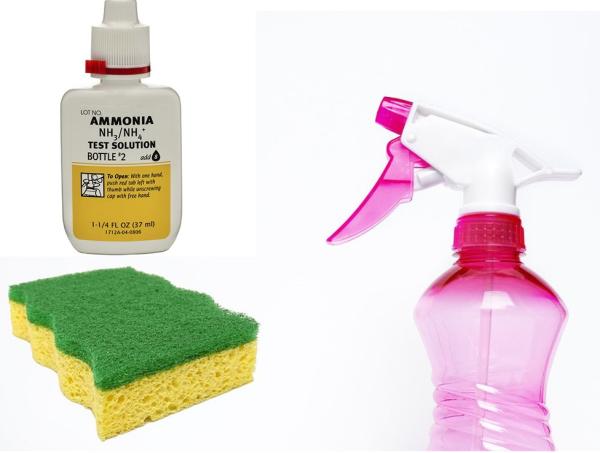
Ammonia in its normal form is a gas which can be very volatile. Household ammonia, however, is a solution of this gas dissolved in water. This is so that it can be handled with less risk, since inhaling ammonia gas is very hazardous. Ammonia is commonly used in pharmaceuticals and many household cleaners. Even when diluted, this is a strong chemical which is incredibly effective in cleaning. Its potent properties make it an particularly effective in removing dirt and stains from numerous surfaces.
One very important thing to remember when using ammonia to clean at home is to NEVER mix it with bleach. Doing so causes a highly toxic chemical reaction. If you'd like to learn about the 10 household uses for ammonia, keep reading this oneHOWTO article.
While we need to respect the strength of ammonia, it is used because it is a highly effective cleaner, stain-remover and odor-remover. This is why we provide the 10 best household uses for ammonia. They are:
- Ammonia uses in the garden
- Ammonia as a degreaser
- Ammonia as an oven cleaner
- Ammonia to clean household surfaces
- Ammonia as a tile cleaner
- Ammonia to clean wood floors
- Ammonia to clean laundry
- Ammonia to clean shoes
- Ammonia to clean carpets
- Ammonia to remove smells
To see how this can be used in each case, we show you how you can use ammonia solution at home to keep it clean and hygienic. Don't forget to add any of your own ammonia tips and tricks in the comments at the end.
Ammonia uses in the garden
Ammonia is used in agricultural farming as a great source of nitrogen fertilizer. It is so popular in farming that over 88% of manufactured ammonia is used in agriculture. The type of ammonia used in agricultural fertilizer is anhydrous, which means it contains no water. While this is effective, it is also considered one of the most dangerous chemical compounds to store and is, therefore, unsuitable for domestic use.
However, one of the household ammonia uses we would like to highlight is related to agriculture. If you want a lush green lawn and full bloom in your flowerbeds, household ammonia can be used in the garden. You will need:
- Add 1 cup of ammonia per 20 gallons of water
- Add any additional store-bought fertilizer you may like.
You have to be careful with how much you use. Some claim that you will only need 1 drop per plant, so be frugal. Add the ammonia solution to your plants when they look like they may need some help or are dying. The ammonia gives the fertilizer a boost, but it won't necessarily be able to bring a plant back from the dead.
For more, we recommend reading our article how to make natural fertilizer at home for plants and gardens.
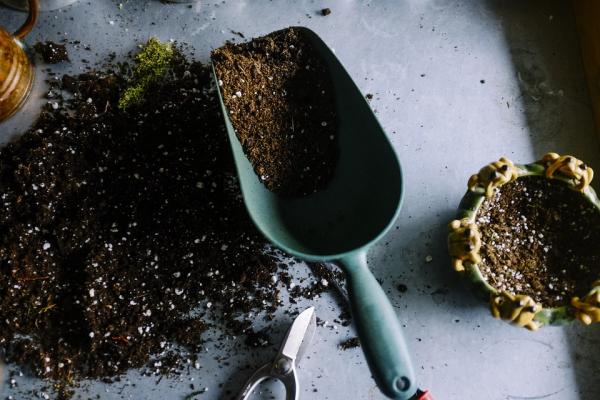
Ammonia as a degreaser
One of the best known uses for ammonia cleaner is as a degreaser. Ammonia is an effective cleaner when trying to remove stains and grease splatters on the stove, counter-tops, stainless steel surfaces, tiles and other dirty surfaces. One of the main reasons ammonia works so well is that it is relatively streak free.
When using ammonia as a degreaser you should:
- Take a suitable bottle (like an empty dishwasher or soda bottle) and fill it up halfway with ammonium hydroxide (Ammonium hydroxide refers to diluted household ammonia).
- Fill the rest with warm water and shake well.
- You can use this ammonia and water solution directly onto the surface or to soak up dried-up stains.
Just remember not to use ammonia on marble surfaces. For more, we recommend reading our article where we discuss, ‘‘Can I use ammonia on stainless steal?’’
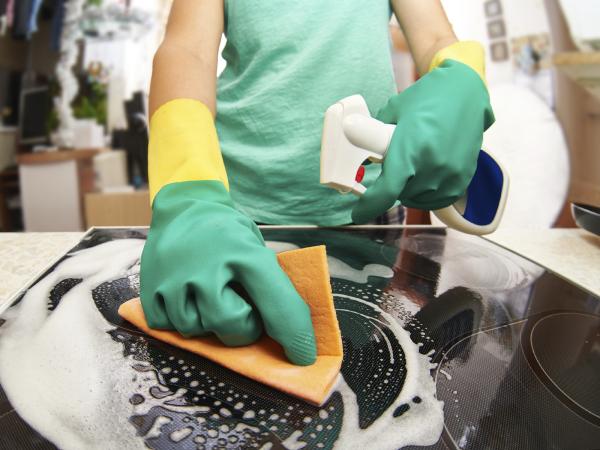
Ammonia as an oven cleaner
You can use the same diluted ammonia solution mentioned above to clean your oven. This solution is effective in removing grease stains or other burned food from inside of the oven. These stains are particularly difficult to clean, which is why many people turn to ammonia as a cleaner.
We first recommend that you soften the interior overnight. Then, you will need to soak the racks and grills in the ammonium hydroxide and water solution. So that you know exactly how much to use, we recommend reading our article where we discuss how to use ammonia to clean the oven.
If you’re looking for a more natural and non-toxic alternative, we suggest that you try cleaning the oven with lemon.
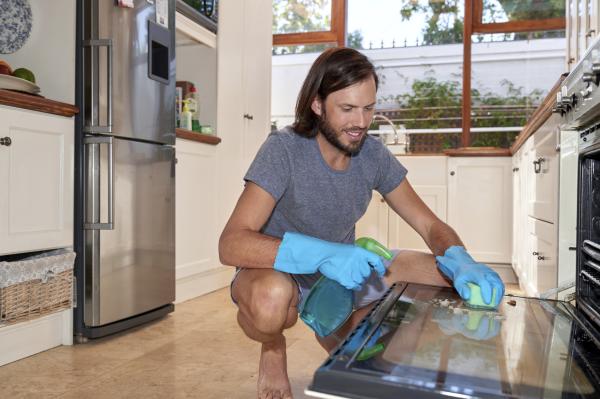
Ammonia to clean household surfaces
You can also clean your windows and mirrors with ammonia for exceptional results. The safe ratio for this ammonia solution would be 2 tablespoons of ammonia (ammonium hydroxide) per half gallon of water.
If you’re worried about the dangers of cleaning with ammonia, you can opt to clean your windows with vinegar. As we’ve already mentioned, ammonia is relatively streak free, so it’s a great alternative to get rid of fingerprints on mirrors.
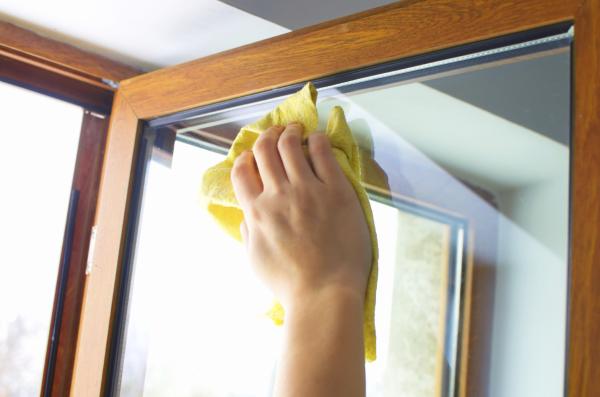
Ammonia as a tile cleaner
Next in our list of 10 household uses for ammonia, is to use it as a tile cleaner in either the bathroom or kitchen.
Ammonia is an incredibly powerful chemical when trying to get rid of hard stains.
Use a quarter cup of ammonia per gallon of water and scrub the tiles clean of the mildew and mold. This type of cleaning method won’t require daily repetition.
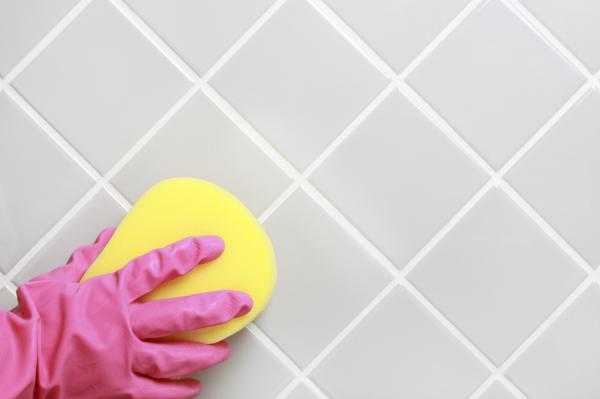
Ammonia to clean wood floors
Diluted ammonia with water is also great when wanting to clean wooden floors and furniture. Additionally, it can also be used strip wood and remove furniture polish or paint. For this reason, it's important that you dilute the ammonia with water to make sure it doesn’t remove any paint or covering you want to keep. This is because the harshness of ammonia can deteriorate sensitive wood.

Ammonia to clean laundry
Ammonia is also incredibly effective in cleaning clothes and removing stains from fabric. Are you wanting to remove wine stains from your clothes? Ammonia diluted in water can help do this. Be careful with delicate material as you do not want to damage the fabric. If you’re wanting to clean delicate fabric like silk or linen, we recommend using a softer cleaning method.
For more read how to you ammonia to clean clothes.
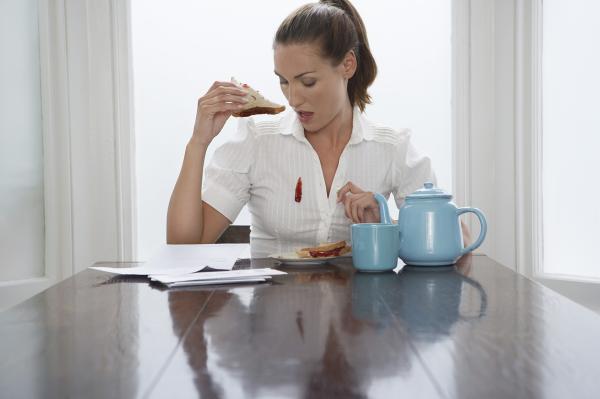
Ammonia to clean shoes
You can also use ammonia to clean and remove dirt from shoes, however make sure to only use this solution on non-washable fabrics. Make a mixture of water, ammonia and soap to clean all types of shoes.
Read how to clean white converse fabric.
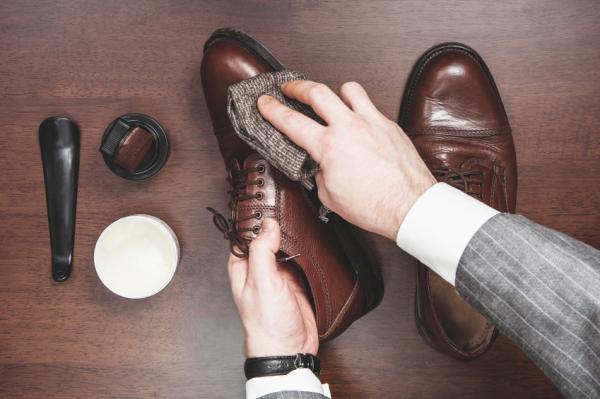
Ammonia to clean carpets
Are you wanting to use ammonia to clean your carpets and rugs? Use a spray bottle to apply the ammonia and water solution to dirty spots and stains on your carpets. The spray bottle will allow the solution to spread lightly and take effect. Don't use too much or you can end up taking the dye out of the carpet. For this reason, it is always best to err on the side of caution when making up your ammonia solution.
For more specific advice, you can learn how to use ammonia to clean carpets.
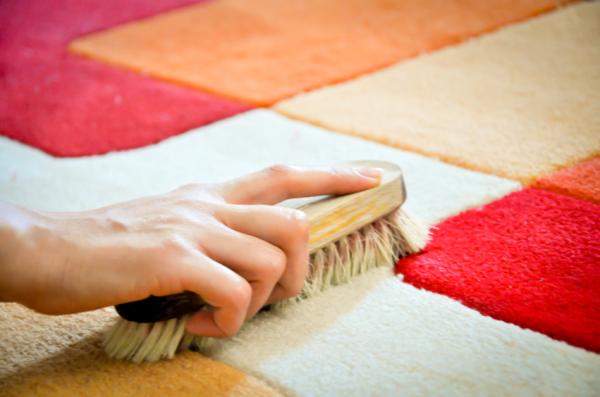
Ammonia to remove smells
Ammonia is also very effective in eliminating odors from fabrics. These smells could be those caused by moisture or mold in dishcloths or towels. Add some ammonia to the machine when washing these fabrics to notice the effects. You can also use this product as a fabric softener, due to the fact that it reduces static electricity.
Read how to use ammonia to clean.
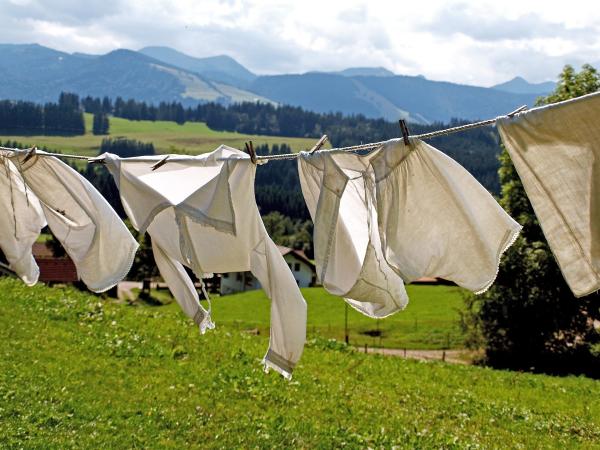
Dangers of cleaning with ammonia
Now that you know these household ammonia uses to clean, freshen and remove stains, it is important you know to respect this chemical. Ammonia is a powerful chemical which needs to be handled with caution. Always make sure you are using the correct type of ammonia or ammonium hydroxide and mixing it appropriately when using it.
When mixing ammonia, you will need to do it in a well ventilated area. One of the most common mistakes is to lean over the bucket or whatever receptacle you use to make the ammonia solution. The strong ammonia odor can go into your nose and burn your airways. Always keep your face away from it and avoid splashing the ammonia. It is best to use rubber gloves at all times, even when it is a solution.
Additionally, make sure to never mix ammonia with bleach. Also, when using any ammonia cleaning products, make sure to use the appropriate clothing and eye protection to avoid irritation to eyes and skin. When using ammonia, always make sure your house is well ventilated, as it can cause coughing, nausea and shortness of breath.
For more, read what happens when you mix bleach and ammonia.
If you want to read similar articles to 10 Household Uses For Ammonia, we recommend you visit our Home cleaning category.
- Another of the uses of ammonia is to get rid of the soot accumulated in glass that has been in contact with fire.